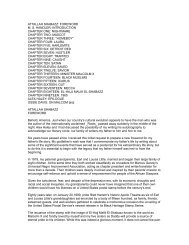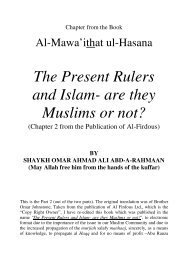You also want an ePaper? Increase the reach of your titles
YUMPU automatically turns print PDFs into web optimized ePapers that Google loves.
mation is vital and critical <strong>to</strong> a proper understanding of <strong>the</strong><br />
narrative, and tells us why Shaphan was competent <strong>to</strong> render<br />
judgment as <strong>to</strong> <strong>the</strong> au<strong>the</strong>nticity of <strong>the</strong> found manuscript.<br />
Preceding Josiah's reign on <strong>the</strong> throne was <strong>the</strong> chaotic<br />
period of Menashe, King Josiah's grandfa<strong>the</strong>r persecu<strong>to</strong>r of<br />
<strong>the</strong> faithful, who burned manuscripts of <strong>the</strong> Torah. 252 Shaphan<br />
came from a scribal dynasty. His grandfa<strong>the</strong>r, in turn a Scribe,<br />
is <strong>the</strong> Hebrew Bible's best example of a chain of tradition from<br />
fa<strong>the</strong>r <strong>to</strong> son mitigating against a physical destruction of Torah<br />
manuscripts. Indeed, Biblical critics are hard pressed <strong>to</strong><br />
explain <strong>the</strong> importance of <strong>the</strong> pedigree of Priestly families and<br />
<strong>the</strong>ir scribal functions. For example, Shemaya ben Nethanel<br />
kept records for King David concerning <strong>the</strong> Priestly families<br />
(I Chron. 24:6), and every king had such records kept<br />
(II Chron. 26:11). Shaphan was not only descendant of a<br />
Priestly family, but his descendants in turn carried on <strong>the</strong><br />
tradition. For example, when Josiah's son Yehoyakim ruled<br />
over Judah, Shaphan's son Gemariah served as Scribe. On<br />
one occasion Jeremiah's disciple, Baruch ben Neriah, recited<br />
a prophetic message in<br />
"—<strong>the</strong> chamber of Gemariah, <strong>the</strong> son of Shaphan <strong>the</strong> scribe in<br />
<strong>the</strong> upper court... . And when Micaiah <strong>the</strong> son of Gemariah,<br />
<strong>the</strong> son of Shaphan, had heard <strong>the</strong> words of <strong>the</strong> Lord he went<br />
in<strong>to</strong> <strong>the</strong> king's house, in<strong>to</strong> <strong>the</strong> scribe's chamber and all <strong>the</strong><br />
princes sat <strong>the</strong>re, even Elishama <strong>the</strong> scribe (Jeremiah 36,<br />
10:12)."<br />
Elishama and his clerks were named after <strong>the</strong>ir scribal<br />
ances<strong>to</strong>rs who are explicitly mentioned having lived in <strong>the</strong><br />
days of Jehosophat, and <strong>the</strong>y "taught in Judah, having <strong>the</strong><br />
book of God's Torah with <strong>the</strong>m (II Chron. 17:9)." This Scribal<br />
dynasty produced none o<strong>the</strong>r than Ezra, <strong>the</strong> Scribe, who<br />
resurrected <strong>the</strong> Torah in his day, and who himself was<br />
descended from Meshulam, or Shalum in abbreviated Hebrew<br />
(Ezra, 7:2), and was from <strong>the</strong> s<strong>to</strong>ck of Aaron <strong>the</strong> High Priest. 253<br />
135




